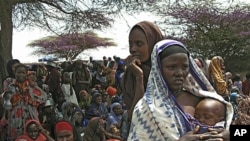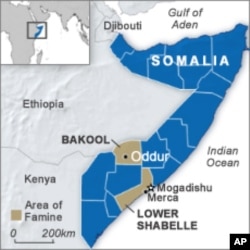Somalia's U.N.-backed central government is condemning the decision by al-Qaida-linked militants to keep international aid workers out despite a worsening famine.
In a statement Saturday, Prime Minister Abdiweli Mohamed Ali also accused the group, al-Shabab, of preventing people from leaving the region under their control in search of food. He appealed for help from the international community, asking for food aid and for support in the government's battle against the militants. The African Union has sent 8,000 peacekeepers to Somalia to help fight the al-Shabab insurgency.
This week, the United Nations declared a famine in southern Somalia's Bakool and Lower Shabelle regions and said nearly half of Somalia's population needs urgent aid. On Friday, the World Health Organization said five more regions in southern Somalia are on the brink of famine.
But al-Shabab says the U.N. declaration of a famine is simply "propaganda."
|
Definition of Famine: The word famine is a term that is not used lightly by humanitarian organizations. The United Nations describes a crisis as a famine only when the following conditions are met:
Current Famine:
|
Al-Shabab spokesman Sheikh Ali Mohamoud Rage on Thursday accused the U.N. of exaggerating the crisis for political reasons. He said al-Shabab will allow increased aid only from foreign agencies currently working in its strongholds, not from organizations it has banned. But he did not specify which organizations.
On Friday, Canada said it would increase by $50 million its humanitarian aid to East Africa and Venezuela pledged an additional $5 million. It is not clear if Canadian or Venezuelan relief agencies are among those banned by al-Shabab.
Meanwhile, the U.N. refugee agency said the death rate of starving Somalis reaching refugees camps in Ethiopia and Kenya is climbing and the exodus of Somalis is continuing at a high rate.
Relief groups are searching for ways to deliver life-saving aid inside the country to save lives and prevent the mass exodus of Somalis to overcrowded camps in neighboring countries.
Relief groups say personnel must keep a low profile to avoid being targeted by the militants, whose members sometimes demand payments and seize deliveries.
The U.N. estimates that tens of thousands of Somalis have already died of malnutrition. It warns a rapid increase in aid is needed to prevent the widespread loss of life.
Overall, the Horn of Africa is experiencing the worst drought in six decades. The U.N. has said more than 11 million people are in need of food aid.
Some information for this report was provided by AP.





